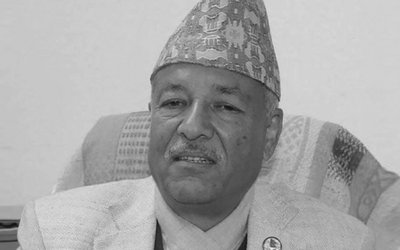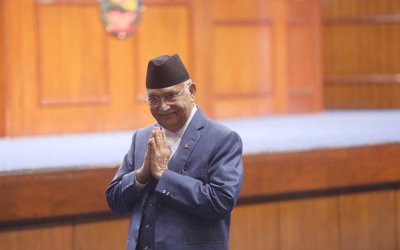
A saffron wave has swept swathes of India since May 16. In what was hardly an unexpected result the Bharatiya Janata Party (BJP), led by its charismatic prime ministerial candidate Narendra Modi, registered a landmark win in the Indian general elections. The Chief Minister (CM) of the western state of Gujarat has been making national and international headlines after lifting his party to its biggest win ever in its 34 years of history. With 282 seats at its kitty, well past the required majority of 272 in the 542-member Lok Sabha, the BJP inflicted a crushing defeat on the ruling Congress Party reducing it to a two-digit numbers in the parliament which was not enough to get the status of the constitutionally-provisioned main opposition.
While the Modi wave had gripped the whole nation long before the election results began to pour in, many pundits have now started speculating the demise of the Indian National Congress. Many were quick to write the obituary of India's Grand Old Party that had ruled the country most of the years since India gained independence from the British colony in 1947. No doubt, rising prices, corruption, poor internal security did the Congress in. It also faced a leadership crisis with Rahul Gandhi, who led the election campaign, completely failing to make the impact. And there seems no other figure to fill in the shoes. It was not unexpected, therefore, that not only the critics even the die-hard supporters of the Congress began to doubt the future of the Congress. Still it would be premature to pass a judgment on the future of the GOP.
It is not the first time that the political pundits had written the Congress’ obituary. They had done it before. But each time they did it, they have been proved wrong. Each time Congress Party has bounced back from the brink of collapse.
It started in the late Seventies immediately in the aftermath of the emergency rule of Prime Minister Indira Gandhi. In the elections held three years after the widely unpopular and much-criticized emergency, the Congress was trounced. Thoroughly. It lost almost 200 seats ending up to its lowest tally till then. Riding on public anger against Gandhi’s authoritarian rule, a loose coalition of Janata Dal assumed power with a thumping majority. The intra party conflict between Gandhi and other senior leaders even led to many veteran Congress stalwarts like Jagjivan Ram, Hemwati Nandan Bahuguna and Nandini Satpathy to part ways with Gandhi right before the elections. Many thought it was all over for the Congress. It was not.
However, the coalition government of Janata Dal under Morarji Desai soon lost popular support and collapsed under the weight of contradictory interests of the partners of the ragtag coalition. As internal bickering deepened, it disintegrated in no time prompting early general elections, two years ahead of the schedule. The Congress bounced back to retrieve the glory it lost only three years ago. It secured a landslide victory bagging 351 seats in the 542-member body. The Congress further bettered its showing four years later in the wake of the sympathy wave over the assassination of prime minister Indira Gandhi.
Hit by a series of scandals including the infamous Bofors scam the Congress again found itself on the precipice following a heavy defeat in the 1989 elections. The party was pushed to the margin after opposition parties came together to forge a National Front that went on to form the government under a one-time Congressman, V. P. Singh. The party with more than a two-thirds majority and without a main opposition in the previous parliament had been pushed to the opposition bench. It was not to continue for long though. The fall of the National Front government over the internal bickering led to the fresh elections within two years in which the Congress, despite failing to win a clear majority, won enough seats to cobble a coalition by bringing in small and regional parties along to the seats of power. The Congress, written off by many not long ago, ruled India for the full five-year term of the parliament before the next elections produced a hung parliament that led to yet another election in a year's time.
The Congress was back in the wilderness soon, though, as the Bharatiya Janata Party rode to power and stayed at the helms on the strength of the required numbers its coalition partners provided under the NDA banner. As India began to "shine" under the BJP-led NDA government, many again saw the Congress as a spent force. The Congress, they thought, would fade in the India Shining era ushered in by the charismatic prime minister Atal Behari Vajpayee. It was not to be. The Congress defied all logic and proved seasoned analysts wrong to make a strong comeback to rule India for the two consecutive 5-year term of Lok Sabha beginning 2004.
The history does not repeat that often. Besides, much water has flowed down the Ganges from the banks of which has emerged a Gujarati national leader to rewrite India's history. Still, given the past record, it may be just too early to write the Congress off yet. The Lotus has blossomed and the Hand crippled, but it may not be a Hands Up yet for the GOP of the world's largest democracy.
- Ukrainian Crisis And The World (Dis)Order
- Apr 22, 2022
- China’s Cautious Steps In The Graveyard Of Empires
- Aug 18, 2021
- Foreign Aid On The Fence!
- Aug 08, 2021
- Communist Party of China centenary celebrations Reading between the lips
- Jul 14, 2021
- Second Wave Of Covid-19 In India: Deadly Blow To The Economy
- Jun 23, 2021














